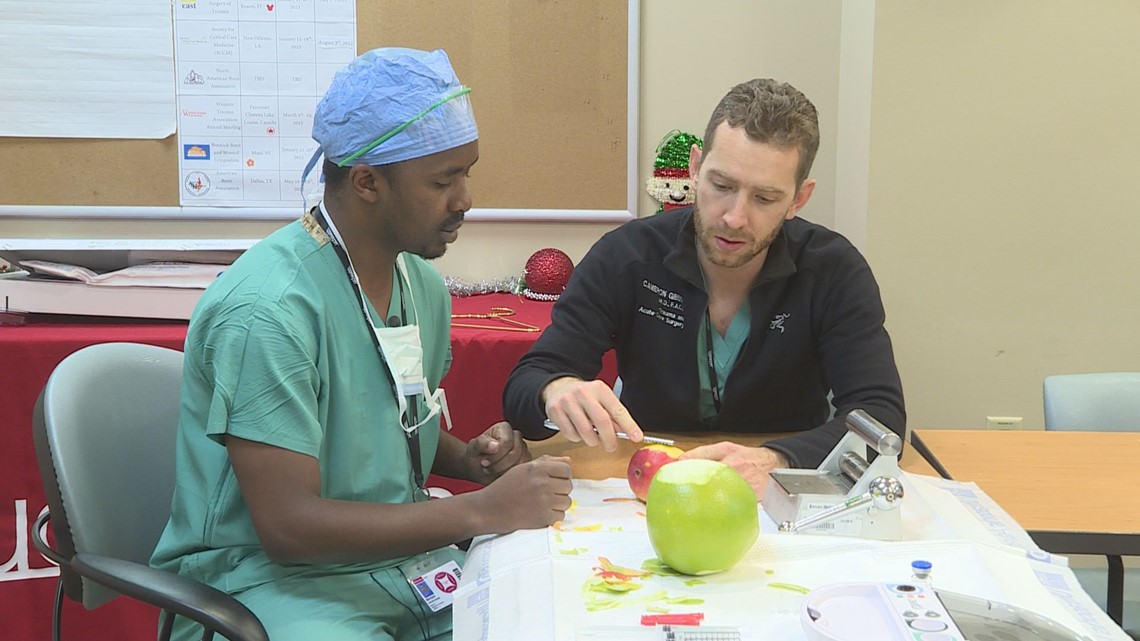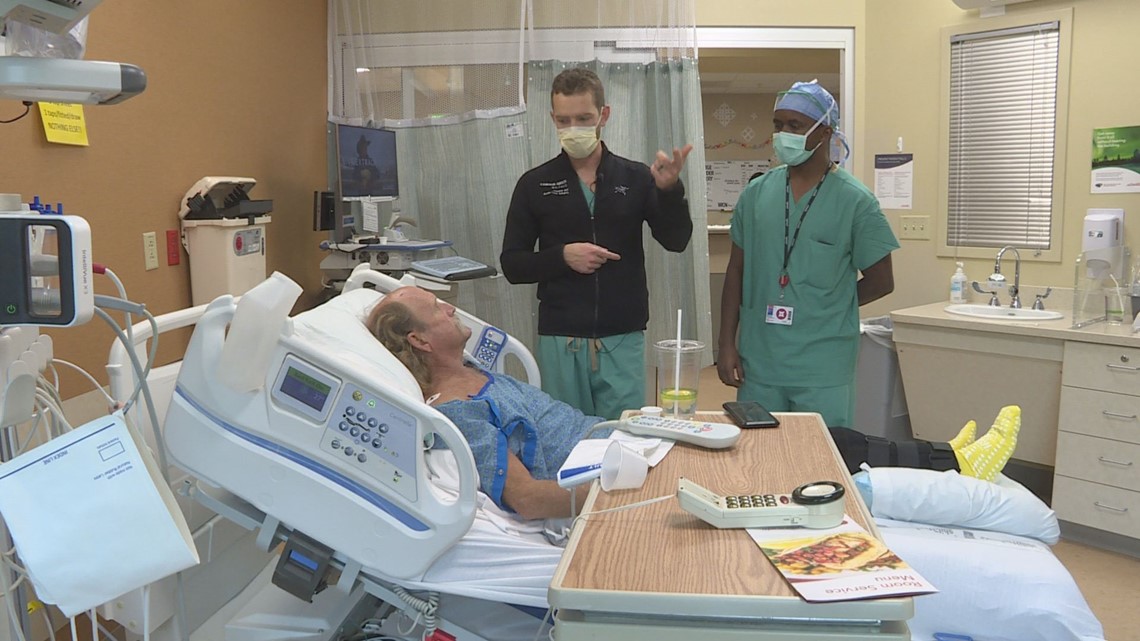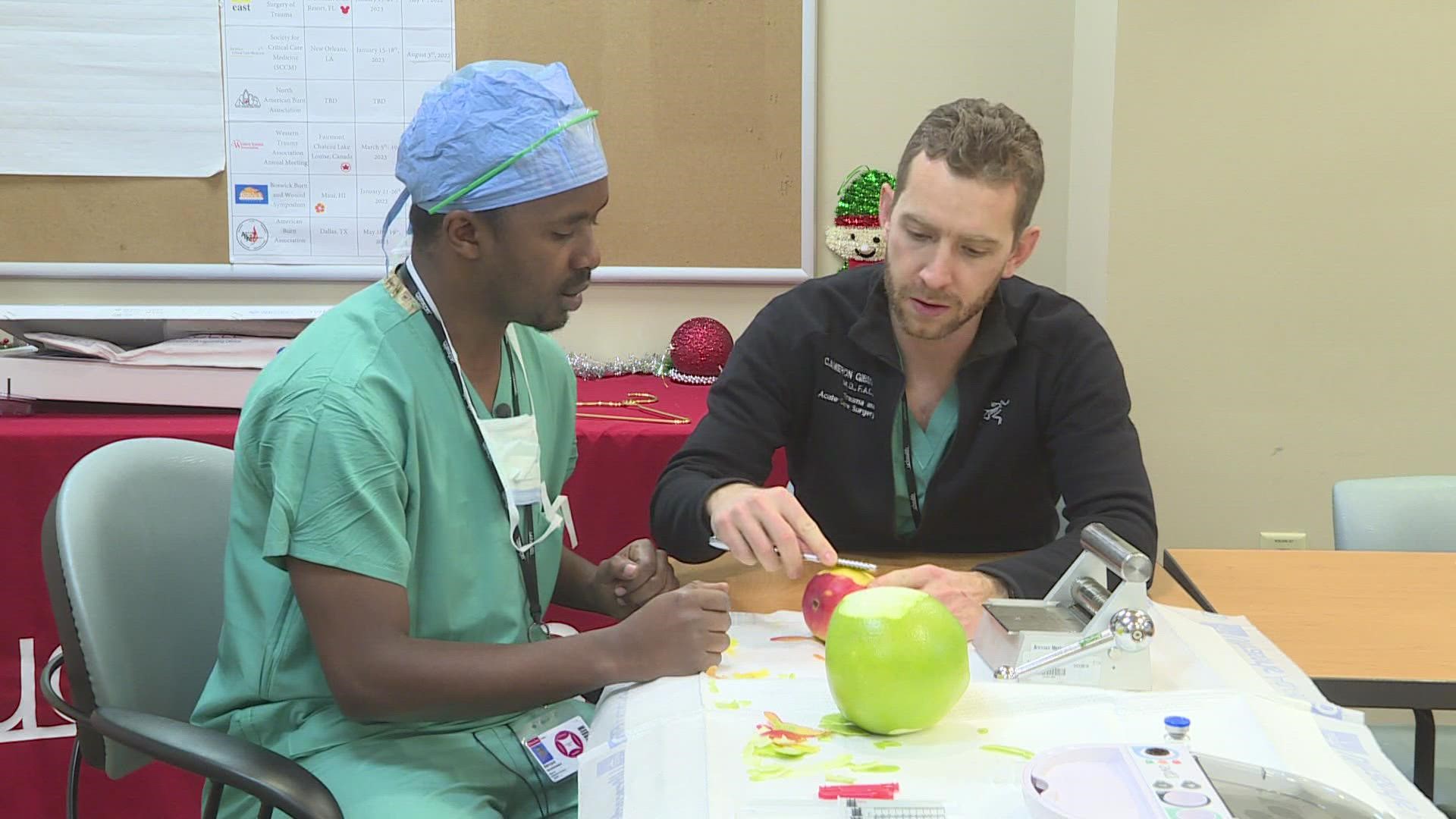AURORA, Colo. — Medicine is often very serious business. But sometimes, it's practicing surgical skills on a piece of fruit.
“Put it at an angle, probably 30 degrees,” Dr. Cameron Gibson instructed his student, Dr. Bernard Umutoniwase. “You just start going back and forth until you see that it catches.”
He uses a cutting tool on a melon to demonstrate the technique.
“Back and forth, back and forth,” he said. “We’re using fruit to mimic the skin, sort of the same way we’d start excision for any burn.”
Gibson is a surgeon at UCHealth’s Burn and Frostbite Center. His student, today, is Dr. Bernard Umutoniwase.
“We’re preparing the wound bed for the skin graft,” he says.
But in this case, it's all just fruit.
“That’s nice,” Umutoniwase laughs. “Nice technique. A nice approach to teach.”


Umutoniwase, nicknamed Dr. Mutoni, is visiting Colorado for several weeks from Rwanda, to learn more about treating burn patients from the doctors at UCHealth.
Back home, he is a general surgeon at Kibogora Hospital, treating a variety of patients needing surgical procedures.
“We do it all: urology, plastic, gynecology obstetric cases,” he said. “We treat burns, but we don’t have the resources that we can improve our skills in burn management.”
Today, many of those burn patients have to transfer to another hospital several hours away.
But Dr. Mutoni’s hospital plans to open a new burn center soon. He hopes to use the skills he learns in Colorado to help build the burn center and teach health care colleagues back home.
“If our hospital [has] a good burn unit, we’ll be able to not transfer those patients. [We can] manage our patients without delaying,” he said.
“We believe that when someone is burned they should receive the best care possible,” Gibson said. “And it shouldn’t be dependent upon whether or not the burn happens in U.S., Canada or Rwanda.”
“The vast majority of burn injuries in the globe happen in underdeveloped and poor countries. And unfortunately those countries don’t have the resources to treat those burns,” said Dr. Arek Wiktor, Medical Director of the UCHealth Burn and Frostbite Center.
“It’s our duty to pass on the knowledge to surgeons like Dr. Mutoni to bring back to his people so he can improve those outcomes," he said.
While learning in Colorado, Dr. Mutoni joins the UCHealth doctors in the operating room and during rounds with the team meeting with patients. He learns more about wound care and pain control specific to burn patients, and observes the partnership between members of the healthcare team.


“We are teaching him all of the aspects of burn care, from start to finish,” Wiktor said. “When someone comes in, how to stabilize them. The different surgical techniques we have. Also adapting what is available for him in his country and his resources.”
There are some American techniques or tools that won't transfer to Dr. Mutoni’s hospital in Rwanda. Some of the surgical resources here aren’t available there, or doctors turn to different alternatives. Gibson provided this example:
“We talk about primary dressings -- the first layer that goes on top of the wound. Here, we use a lot of things that are petroleum-based. They also have that in Rwanda, but another thing they have in abundance is banana leaves,” he said. “And that’s actually been shown in literature to actually work, and is extremely cheap, by comparison. It leads to good wound healing. It's less painful for patients, and is very cost-effective.”
Another difference between their two worlds: frostbite.
“Frostbite is new for me,” Dr. Mutoni said. “It is not understandable in Rwanda that you can get burns from the coldness.”
Dr. Mutoni will return to Rwanda at the end of December. He said while in Colorado he has learned many techniques, but also other valuable skills, like communication, teamwork and accountability.
“One surgeon [alone] can’t succeed," he said. "I want to teach my other providers to my hospital, so that we could improve, together, the health of burn patients.”
SUGGESTED VIDEOS: Latest from 9NEWS

